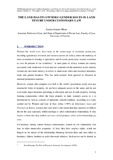Location
Our Vision is to be a world-class university committed to scholarly excellence.
Our Mission is to provide quality university education and training and to embody the aspirations of the Kenyan people and the global community through creation, preservation, integration, transmission and utilization of knowledge.
Core Values
In order to realize the above vision and mission, certain shared values shall be nurtured. There is great need for the University to be guided by the right values derived from the virtues and moral standards of the Kenyan and wider society.
Core Functions
Teaching and Learning: The university offers innovative , relevant and market driven academic programmes , both at undergraduate and postgraduate levels with inbuilt quality control systems the university also provides an environment and policy framework for undertaking high quality and relevant research
Members:
Resources
Displaying 196 - 200 of 298The Land has its Owners! Gender Issues in Land Tenure Under Customary Law
This paper looks at issues of gender and tenure in African customary law. It argues that under all systems of law in many African countries, ownership of land and associated resources is very much anchored in patriarchy. It decries the failure to isolate positive aspects of customary law and the preponderance of women-unfriendly customary law which influences statutory and other forms of law. Part II of the paper provides the conceptual and theoretical premises of the paper. It looks at patriarchy, gender and law and their impact on tenure relations emphasising the male dominance.
Capacity building for sustainable use of animal genetic resources in developing countries. ILRI-SLU Project progress report for the period 1999-2003
To promote a sustainable and improved use of animal genetic resources in developing countries, ILRI in collaboration with the Swedish University of Agricultural Sciences (SLU), and supported by Sida (Sweden), launched a project training the trainers, for national agricultural research systems (NABS) scientists (national university teachers and researchers) in developing countries.
Impact of land use on water quality in River Njoro Watershed, Kenya.
Water resources Within the River Njoro watershed have become degraded due to high population growth rate and change in land use upsetting environmental stability. Land cover classification using Landsat images (Baldyga et al., 2004) shows loss of about 20% of forested areas between 1986 and 2003 in the Watershed. The forested and large-scale farm areas have been converted mainly into srnall-scale mixed agriculture and human settlements. These changes have impacted negatively on the ecological integrity and hydrologic processes in the watershed (Shivoga.
Infiltration and surface runoff responses To land use and tillage in Awach Kano Watershed, Lake Victoria Basin.
Understanding of runoff sources and sinks coupled with development of rubost models
that provide rapid and less expensive assessment of the impacts of land management on
surface runoff is critical in the management of soil and water resources. In this study, a
stratified sampling procedure was used to set up 51 runoff plots on representative land
use types on the three slope zones in the landscape. On each slope zone a completely
randomized design was utilized. Runoff measurements were done for 120 rainfall events
Land Alienation, Land Tenure and Tourism in Maasailand, Kenya
Land is a primary resource for international tourism development. The relationship of indigenous
systems of land tenure, and the history of land alienation to tourism in African nations, however, is
problematic. Governments of some African nations are now emphasizing the traditional land
rights of indigenous people in determining land use for economic development. Land is a key
resource for the local participation of the Kenyan people in development, and indigenous land




